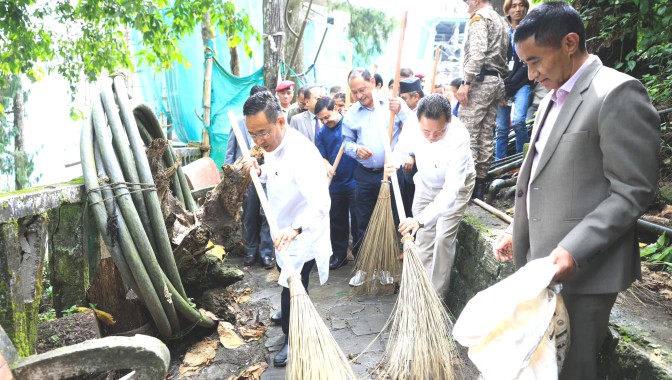




















Thursday, Sep 19, 2024 09:00 [IST]
Last Update: Thursday, Sep 19, 2024 03:26 [IST]
GANGTOK,(IPR): In a significant step towards promoting cleanliness and
environmental sustainability, Chief Minister Prem Singh Tamang-Golay officially
launched the State-Level Swachhata Hi Sewa Campaign 2024 with the theme
“Swabhav Swachhata — Sanskar Swachhata” at Chintan Bhawan today.
Organised
by the Swachh Bharat Mission (Grameen), Rural Development Department (RDD) and
Swachh Bharat Mission (Urban), Urban Development department, the programme had
the presence of cabinet ministers, Lok Sabha MP, advisors, MLAs, zilla adhyakshas,
upadhyakshas, zilla panchayats, Mayor and Deputy Mayor (GMC), Councillors, chief
secretary, Director General of Police, additional chief secretary, head of departments,
District Collectors, ADC (Development), BDOs, MEOs, ULBs, dignitaries, officers
and staff of UDD and RDD.
At the
onset of the event, the Chief Minister administered the Swachhata Hi Sewa
pledge, officially launching the Swachhata Hi Seva 2024 campaign.
Addressing
the event, the Chief Minister extended warm wishes for Viswakarma Puja and
Indrajatra to the people of Sikkim, particularly acknowledging the hardworking
'Chalak' brothers. Conveying birthday greetings to Prime Minister Narendra Modi
on behalf of the people of Sikkim, he congratulated him on the successful
10-year milestone of the Swachh Bharat Abhiyan vision and mission, commending
its evolution into a global movement. Sikkim's active engagement in the annual
Swachhata Hi Seva campaign was emphasised, with a call for widespread citizen
participation to promote cleanliness and instil a sense of responsibility for
sanitation.
Addressing
the impermanent nature of things, the Chief Minister emphasised the importance
of acknowledging impermanence as a catalyst for natural change. This awareness,
he emphasised, is crucial at all levels to realize the vision of Swachh Bharat.
Sikkim's
leading role in cleanliness initiatives was acknowledged, with the announcement
of cash awards for the best-performing urban bodies in terms of cleanliness,
demonstrating the government's commitment to cleanliness.
The Chief
Minister stressed the necessity of sustained efforts to realize the Prime
Minister's vision, advocating for a targeted approach in specific domains. He
also encouraged educational institutions, religious bodies, non-governmental
organisations, and self-help groups to focus on overlooked areas and work
towards transforming them in line with this year's theme, "Swabhav
Swachhata, Sanskar Swachhata."
Emphasising
the importance of the Swachhata Hi Sewa campaign, the Chief Minister urged all
citizens to integrate it into their daily routines, presenting an opportunity
to mobilize tangible action on the ground with the involvement of all
stakeholders. The two-week celebration should begin at the household level,
ensuring its success at the State level, he suggested. Highlighting the theme
of 'Swabhav Swachhata-Sanskar Swachhata,' he proposed a shift in attitudes and
cultural perceptions towards sanitation.
The Chief
Minister called for Shramdaan on 21st September, urging the identification and
cleaning of blackspots in every area. He requested all MLAs, elected
representatives, civil society organizations, NGOs, and self-help groups to
organize clean-up activities on the said day. Additionally, he suggested taking
before and after photographs of the areas being cleaned for upload to social
media portals to encourage and motivate each other.
Stressing
that cleanliness should begin with individual efforts and advocating for
segregation at the individual level, the Chief Minister suggested counselling
by MEOs on the benefits of segregation and encouraged the implementation of a
3-bin policy for segregation. He highlighted the need for collective
responsibility to ensure the initiative's success and long-term viability.
The Chief
Minister emphasised the strict adherence to standard operating procedures
(SOPs) and circulars issued by UDD & RDD, stating that these SOPs has the
potential to transform Sikkim into a pristine and aesthetically pleasing state.
Furthermore,
the Chief Minister announced a discretionary grant for Block Development
Officers (BDOs) to facilitate the development of Gram Panchayats, as well as
cash awards for the best-performing Gram Panchayats in rural areas. Collective
efforts were deemed essential for the grand celebrations of Sikkim's 50 years
of Statehood, culminating on May 16, 2025, with the Prime Minister of India as
the chief guest.
The theme
"Hamro Sahabhagita, Hamro Safalta" was highlighted, emphasising the
involvement of every citizen to ensure the success of government initiatives.
The Chief
Minister congratulated UDD & RDD on the successful launch of the Swachata
hi Seva campaign, concluding with a call to embrace the theme of "Sunaulo
Sikkim, Samridha Sikkim, Samartha Sikkim" in letter and in spirit, to
ensure Sikkim's success in every field.
During
his speech, UDD minister Bhoj Raj Rai highlighted the significant progress made
under the Swachh Bharat Mission 2.0. The initiative encompasses crucial aspects
such as solid waste management, information education, capacity building,
toilet construction, and waste water management, all actively pursued by the
department.
An
important achievement is the introduction of a PET bottle management system in
all of Sikkim's markets to effectively deal with plastic waste. Moreover, the
department is working on establishing Material Recovery Facilities to further
enhance waste management practices, as stated by the minister.
The minister
also stressed the active involvement of Urban Local Bodies in promoting
cleanliness and emphasised the crucial role of public participation in ensuring
the success of these efforts. The department has involved Self-Help Groups
(SHGs) in waste management initiatives, providing them with essential funds to
support their work and ensure their safety and efficiency.
To
recognise outstanding performance, cash awards will be presented to the
best-performing Urban Bodies on Gandhi Jayanti, the minister mentioned. He also
commended the dedication of Safai Mitras, acknowledging their selfless
contributions.
Looking
ahead, the department aims to transition to a paperless environment through
initiatives such as E-Office and E- Licenses. The minister emphasised the
importance of initiating a collective shift in mindset among the populace to
achieve lasting cleanliness goals. He highlighted the necessity for united
efforts in this context, with waste segregation as the initial phase.
RDD
minister Arun Upreti in his address stated that the Swachhata Hi Sewa Campaign
is a nationwide initiative to create awareness about the importance of
cleanliness and sanitation. He further mentioned that the Chief Minister's
support underscores the campaign's importance, promoting sustained efforts to
integrate cleanliness into daily life, and is committed to making the state a
model of environmental stewardship. Emphasising the need for collective action
to achieve a cleaner and greener Sikkim he urged all citizens, government
officials, and stakeholders to participate actively in the campaign and
contribute to making Sikkim a shining example of environmental responsibility.
Earlier, D
Anandan, principal secretary, RDD in his welcome address said that the state
launch of Swachhata Hi Seva 2024 in Sikkim emphasises the vital role of
cleanliness and sanitation in enhancing public health and reinforces the
collective commitment of the State, and its citizens to uphold cleanliness and
sanitation as fundamental values in their daily lives. He stated that this
initiative celebrates the achievements of the Swachh Bharat Mission over the
past decade, which has significantly improved sanitation coverage and health
outcomes across India. He also mentioned that the initiative encourages local
involvement through cleanliness drives and recognizes the contributions of
sanitation workers. As Sikkim marks its 50th Statehood anniversary, it aims to
maintain its reputation as a cleanliness leader in India, he added.
During
the event, the Chief Minister participated in the groundbreaking ceremony of
the virtual laying of the foundation stone for the Aspirational Toilets Project
under the UDD. These facilities aim to set a new standard for hygiene and
cleanliness, equipped with essential amenities such as sanitary napkin
dispensers, incinerators, and feeding rooms.
The Chief
Minister virtually inaugurated the Material Recovery Facility and Composting
Unit at the Tashiling Secretariat complex and also unveiled the Standard
Operating Procedures for the 3-Bin campaign.
The Chief
Minister also launched the Swachhata Jingle produced by the Rural Development
Department (RDD) and handed over the Mobile Treatment Unit for further
implementation of the initiatives to Soreng and Pakyong Districts.
On the
occasion, recognising the dedication of Safai Mitras, dignity cards were handed
over to five Safai Mitras in line with the Safai Mitra Suraksha Shibir, namely
1. Dew
Man Rai of Kopi Bari, Syari.
2. Lamu
Doma Bhutia, Lingtam Phadamchen
3. Anil
Pal, Arithang
4. Bir
Bahadur Chettri, Development Area
5. Bharat
Bishwakarma, Arithang
The vote
of thanks was proposed by Jitendra Singh Raje, commissioner-cum-secretary, UDD.
The
launch programme was followed by a community-driven cleanliness initiative at
Hurhuray Dara, located near the Sikkim Legislative Assembly. The event saw the
active participation of the Chief Minister, along with other esteemed
dignitaries, who joined hands with the local volunteers to clean and beautify
the area.
It may be
noted here that under the Swachata hi Seva campaign, a series of events have
been lined up across Sikkim from September 17 culminating on Swachh Bharat
Diwas on October 2.
